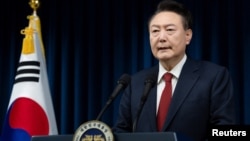A South Korean court has approved an arrest warrant for impeached President Yoon Suk Yeol, who faces insurrection charges over his attempt to impose martial law earlier this month.
The Seoul Western District Court issued the warrant on Tuesday, marking the first time a sitting South Korean president has faced arrest, according to local media.
Yoon was impeached in mid-December, suspending his presidential powers while the Constitutional Court reviews the case.
In addition to impeachment, Yoon is being investigated for insurrection and abuse of power by a joint government investigation team. Authorities sought the arrest warrant after Yoon ignored three summonses for questioning.
Yoon’s legal team has refused to cooperate with the investigation, arguing that the impeachment trial should take priority over any criminal proceedings.
It is not clear when any arrest attempt will be made or how aggressive authorities will be in attempting to execute the warrant.
The Presidential Security Service has so far prevented investigators from entering the presidential office compound or Yoon’s official residence for court-approved searches, citing security and military considerations.
South Korean presidents are generally immune from prosecution while in office, except for cases involving rebellion or treason.
Yoon declared martial law on December 3 – the first such decree since South Korea became a democracy in the 1980s – but lawmakers overturned the order within hours.
Yoon has said the martial law declaration was necessary to send a “strong message” to his rivals, whom he accused of being North Korea sympathizers obstructing his agenda.
The impeachment process is also filled with uncertainty. The Constitutional Court has 180 days to rule on Yoon’s removal, but with three judicial seats vacant, all six remaining justices must unanimously agree to uphold the impeachment.
Efforts to appoint new judges have stalled, with the opposition threatening to impeach successive acting presidents who refuse to approve them, fueling fears of a prolonged political deadlock that has already hurt South Korea's economy.
Last week, the value of the South Korean won hit a 16-year low against the U.S. dollar, raising concerns about higher energy import costs and increased consumer prices.




